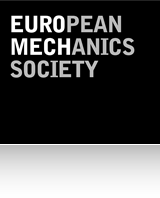595 – Biomechanics and computer assisted surgery meets medical reality
Chairperson:
Professor Mathias Brieu
Laboratoire de Mécanique de Lille (FRE 3723 CNRS)
Centrale Lille
Bd Paul Langevin
Cité Scientifique
F-59650 Villeneuve d’Ascq, France
email: mathias.brieu@ec-lille.fr
Co-chairperson
Prof. Stéphane P.A. Bordas
Campus Kirchberg
University of Luxembourg
6, rue Richard Coudenhove-Kalergi
L-1359 Luxembourg
email: stephane.bordas@uni.lu
Prof. Emmanuel Leriche
Université des Sciences et Technologies de Lille 1
Laboratoire de Mécanique de Lille
Lille, France
email: Emmanuel.Leriche@univ-lille1.fr
Prof. Spencer Sherwin
Faculty of Engineering
Department of Aeronautics
359 Roderic Hill Building
Imperial College London, South Kensington Campus,
London SW7 2AZ, UK
email: s.sherwin@imperial.ac.uk
Computational methods have had a wide and deep impact in all areas of our lives, leading to the development of safer, lighter and more effective products. One current and burning challenge is to enable such developments to have similar impact onto biomechanics and biomedicine. The promises of personalised medicine in terms of improved patient-specific care remain indeed largely elusive and clinicians and patients are awaiting personalised computer models and in-silico simulation tools able to decisively improve patient-specific healthcare and well-being.
Numerical modelling of medical therapies has the potential to help with diagnosis, enable the estimation of the impact of surgical interventions, optimise treatment schemes, train surgeons to hone their skills and guide them during the surgical interventions themselves.
If we were able to model the effect of treatments, in particular surgery on an individual patient, patient care could be significantly enhanced. Examples include cardio-thoracic and aortic surgery or brain, abdominal, pelvic or orthopedic surgery, nano-particle cancer treatment, drug delivery and diffusion in organs, etc.
The proposed Euromech colloquium is intend to gather researchers involved in engineering working jointly with clinicians to develop, optimize and promote the numerical simulation for healthcare. The colloquium will engage with investigators focusing on the patient-specific characterization and patient-specific simulation. In addition, we will encourage the comparison of numerical simulation with medical reality and the impact of the modelling assumptions on the accuracy
